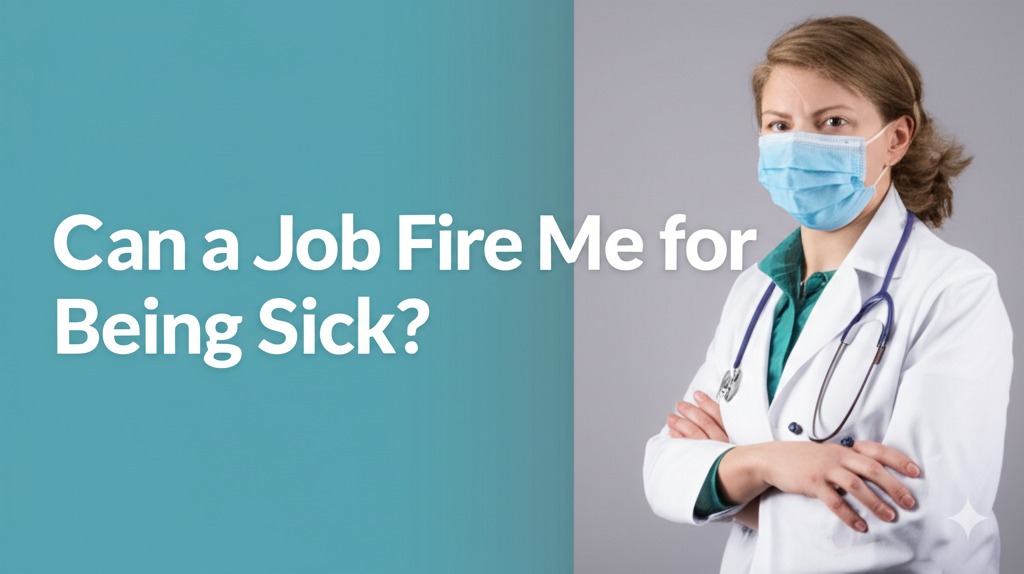
Getting sick is a part of life — but what happens when illness gets in the way of your job? You may be wondering, “Can my employer actually fire me for being sick?” The answer isn’t always straightforward. Depending on your situation, there are legal protections in place, but there are also some exceptions.
In this article, we’ll break down the laws, your rights as an employee, and what to do if you’re facing termination due to illness. Whether you’re dealing with a cold, a chronic condition, or something more serious, here’s what you need to know.
Understanding At-Will Employment
In most states in the U.S., employment is considered “at-will” — meaning your employer can fire you at any time, for almost any reason, as long as it’s not illegal. That includes:
- No advance notice required
- No reason needed
- No severance mandated (unless contracted)
This can make it feel like you have no protection, but thankfully, there are some important exceptions when it comes to health-related issues.
Legal Protections for Sick Employees
There are several federal and state laws that protect workers from being unfairly terminated for health-related reasons. Here are the most significant ones:
1. Family and Medical Leave Act (FMLA)
The FMLA provides eligible employees with up to 12 weeks of unpaid, job-protected leave per year for serious health conditions, among other things.
To qualify, you must:
- Work for a covered employer (typically with 50+ employees)
- Have worked at least 12 months
- Have clocked at least 1,250 hours during the past year
If you’re protected under FMLA, your employer cannot legally fire you while you’re out on approved medical leave.
💡 Keep in mind: Common colds and minor illnesses usually don’t qualify under FMLA unless complications arise.
2. Americans with Disabilities Act (ADA)
If your illness qualifies as a disability (including chronic or long-term conditions like cancer, diabetes, or depression), you may be protected under the ADA.
Employers with 15+ employees must provide reasonable accommodations unless it causes undue hardship. This could include:
- Flexible schedules
- Remote work options
- Extended medical leave
If your employer fires you without trying to accommodate your condition, it could be considered discrimination under the ADA.
When It Is Legal to Be Fired While Sick
Unfortunately, not all situations are protected. Here are a few cases where your employer might be within their rights:
You Miss Work Without Notice or Documentation
If you call out sick frequently without giving notice or providing a doctor’s note (when required), your employer may see it as job abandonment or unreliability.
You’re Not Eligible for FMLA or ADA
If your company is too small or you haven’t been there long enough, FMLA and ADA protections may not apply, making you more vulnerable to termination.
Your Illness Impacts Your Job Performance Long-Term
In some situations, if an illness permanently prevents you from doing your job, and no reasonable accommodation can be made, an employer may have grounds for termination — but only after exploring all options.
What to Do If You’re Sick and Worried About Your Job
If you’re dealing with an illness, here are some proactive steps to protect yourself:
1. Communicate Clearly and Early
Let your employer know as soon as possible if you’re going to miss work. Provide:
- Estimated return date
- Doctor’s notes if necessary
- Updates as things change
2. Know Your Rights
Check if you qualify for protections under:
- FMLA
- ADA
- State-specific leave laws
You can also contact your HR department or consult with an employment attorney for personalized guidance.
3. Document Everything
Keep records of:
- Doctor’s notes and diagnoses
- Communication with your employer
- Requests for accommodations
If you ever need to file a complaint, documentation is key.
Can You Sue If You’re Fired for Being Sick?
If you believe your employer fired you because of a legitimate illness and you were protected under laws like FMLA or ADA, you may have grounds for a lawsuit.
You can file a complaint with:
- The U.S. Department of Labor (for FMLA violations)
- The Equal Employment Opportunity Commission (EEOC) (for ADA violations)
Be aware that there are strict time limits to file, often 180 days from the date of the incident.
State Laws May Offer Additional Protections
Some states go beyond federal laws when it comes to employee rights. Depending on where you live, you might have:
- Paid sick leave mandates
- Expanded disability protections
- Stronger wrongful termination laws
Check your state labor board’s website for specific information.
Conclusion: Can a Job Fire Me for Being Sick?
The short answer? Yes — but only under certain conditions.
If your illness is minor, undocumented, or you don’t qualify for federal protections, your job may not be secure. However, if your illness is serious and covered under FMLA or ADA, your employer cannot fire you without risking legal consequences.
Know your rights, stay informed, and don’t hesitate to ask for help. If you’re unsure whether your situation is protected, talking to a lawyer or HR professional can give you clarity and confidence.

Andre Cuevas provides career insights, job search strategies, and professional advice to help individuals navigate the job market and achieve their career goals.





